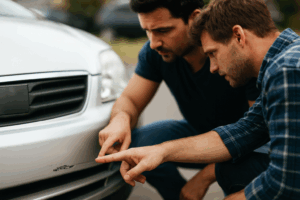
The requirement for a front license plate varies by state in the United States. Currently, there are 29 states in the United States that require front and rear license plates on most motor vehicles. However, many of these states allow exceptions to this rule for motor vehicles other than cars.
For example, For example, in Florida, motorcycle owners are only required to display a rear plate. Similarly, in Virginia, vehicles that are more than 25 years old and are used for exhibition purposes can be issued antique license plates, and only a rear plate is necessary in this case. Therefore, it is important to check each state’s exceptions to front license plate rules, which you can find by clicking the hyperlinks below for the specific laws in each state.
The 29 states in the United States which require front license plates on automobiles are:
These states can impose fines and penalties for non-compliance with this requirement. It’s essential for motorists to check with their local Department of Motor Vehicles (DMV) for the specific rules and exceptions in their state to always ensure they are complying with the vehicle registration laws in their respective state.
Yes, certain vehicles are exempt from front license plate laws in some of the above states. These exemptions vary from state-to-state and can include certain types of vehicles such as historic or classic cars, motorcycles, or commercial vehicles.
Some states also grant exemptions based on the design of the vehicle; if the manufacturer did not design a spot for a front plate, the vehicle might be exempt. However, these exemptions are not universal and depend entirely on individual state laws. Thus, it is advisable to use one of the links above to read the specific laws in your state, or to check with your local Department of Motor Vehicles (DMV) for information regarding your vehicle and state.

There are states within the United States where you shouldn’t be surprised if you notice the absence of a front license plate on cars. In these states, the requirement is relaxed, and only displaying a rear license plate is sufficient.
While many states in the U.S. require both front and rear license plates, there are 21 states that do not mandate a front license plate. However, every state requires at least one license plate on motor vehicles.
The U.S. states which do not require front license plates on automobiles are:
In these states, vehicles are only required to display a rear license plate. It’s important to note that these regulations can change, and exceptions to these license plate rules may exist within each state. Always stay informed to ensure full compliance and avoid potential penalties.
Different states have different requirements for license plates due to variance in the legislative process, historical practice, and administrative preferences. Each state in the United States has the autonomy to form its own motor vehicle regulations, including those related to license plates. Factors such as administrative costs, law enforcement policies, aesthetics, and local culture can all play a part in these decisions.
Some of the primary reasons cited for the variability in license plate laws across US states include:
States opting to forego front license plates often cite cost savings, as producing one plate instead of two saves money. On the other hand, states requiring both front and rear license plates typically stress their importance in law enforcement, as they can assist in identifying vehicles involved in criminal activities. Therefore, the disparity in license plate laws across the United States is a reflection of the unique legislative and administrative choices made by each state.
In summary, the laws regarding license plate display vary significantly across the United States, with 29 states currently requiring both front and rear license plates, while the remaining 21 states necessitating only a rear plate.
It is important to note exceptions to these rules exist in some states, such as Florida’s leniency for motorcycles and Virginia’s provision for antique vehicles. Given the variability and tendency for change in license plate laws, motorists are always urged to check with their local Department of Motor Vehicles (DMV) to stay updated with accurate and current regulations.

If you or a loved one are injured in an accident, call Thompson Law today for a FREE CONSULTATION. We charge NO FEE unless we are able to obtain a settlement for the injury victims we represent.






Thompson Law charges NO FEE unless we obtain a settlement for your case. We’ve put over $1.9 billion in cash settlements in our clients’ pockets. Contact us today for a free, no-obligation consultation to discuss your accident, get your questions answered, and understand your legal options.
State law limits the time you have to file a claim after an injury accident, so call today.